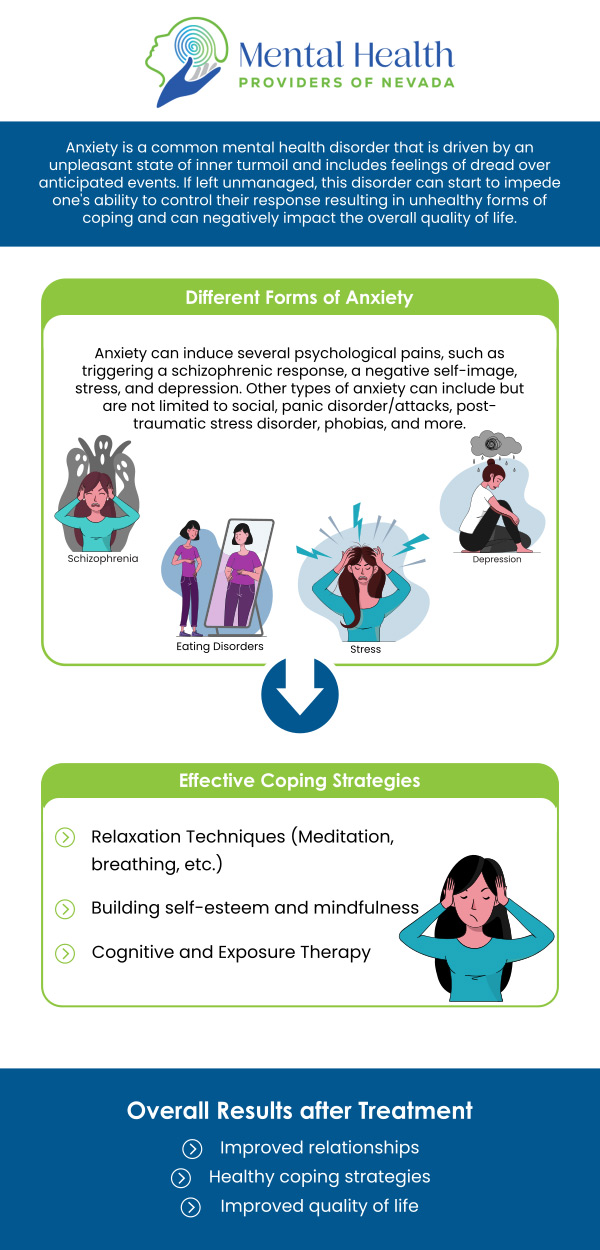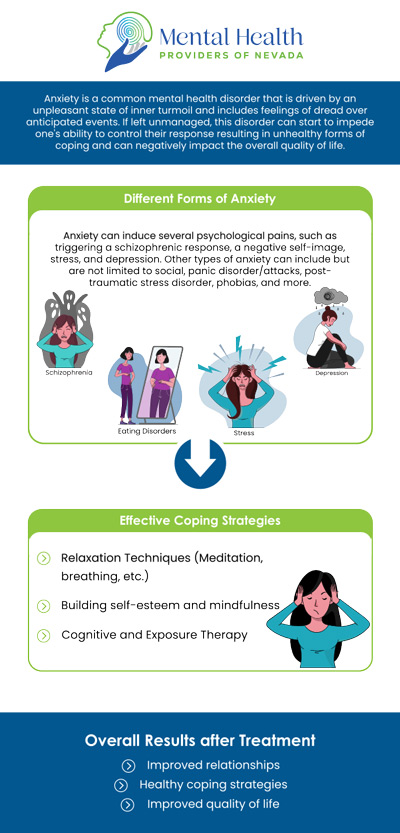Anxiety Treatment Specialist in Las Vegas, NV
Anxiety is a common stress reaction and can help us stay attentive and focused in some situations. Restlessness, frustration, exhaustion, and trouble concentrating are a few signs of anxiety symptoms. Therapy, medication, changes in diet, or a combination of these strategies may be used to treat anxiety. Visit Deborah Louise Perkins, NP, PhD, at Mental Health Providers if you experience any anxiety symptoms. For more information, contact us or schedule an appointment online. We are conveniently located at 2620 Regatta Drive, Suite 246A, Las Vegas, NV 89128.


Table of Contents:
What are the symptoms of anxiety?
Is anxiety a form of mental illness?
What triggers anxiety?
What are the treatment options available for anxiety disorders?
Anxiety is a mental disorder that is characterized by stress, fear, and nervousness. When anxiety persists and starts to affect daily activities, it may be identified as an anxiety disorder. However, there are effective treatments for anxiety disorders, which can have a serious influence on a person’s quality of life.
Anxiety is also capable of manifesting with physical symptoms such as trembling, sweating, and an accelerated heartbeat. Additionally, anxiety may cause gastrointestinal symptoms such as nausea and diarrhea. Insomnia, difficulty concentrating, and panic attacks are also associated with anxiety.
Anxiety symptoms can be mild, moderate, or severe and can range from occasional and manageable to constant and debilitating. Individuals experiencing anxiety may avoid situations or activities that trigger their anxiety, which can significantly affect their quality of life. It’s important to note that not everyone experiences all the symptoms of anxiety, and symptoms can differ depending on the type of anxiety disorder a person has. It’s crucial to seek professional help if anxiety symptoms are affecting one’s ability to function normally or enjoy daily activities.
Anxiety is considered a mental health disorder and is classified as an anxiety disorder. Anxiety disorders are characterized by excessive, persistent, and often irrational worry, fear, or distress. Anxiety is a widespread condition that affects millions globally and can greatly interfere with a person’s daily functioning.
Anxiety disorders include several specific diagnoses, such as generalized anxiety disorder (GAD), panic disorder, social anxiety disorder, and obsessive-compulsive disorder (OCD). These disorders share similar symptoms, including excessive worry, fear, and physical symptoms.
The precise causes of anxiety disorders are not completely understood, but various factors contribute to their development, including genetic predisposition, environmental factors, and brain chemistry. People with a family history of anxiety disorders, traumatic life events, and imbalances in neurotransmitters such as serotonin and dopamine are more likely to develop an anxiety disorder.
Although anxiety is a common human emotion that everyone experiences from time to time, it becomes a mental illness when it becomes chronic, excessive, and interferes with daily functioning.
Anxiety can be triggered by a wide range of factors, including external and internal stimuli. External triggers may include stressful events, such as work-related issues, relationship problems, financial difficulties, and major life changes. Additionally, exposure to traumatic events such as accidents, natural disasters, or violence can lead to anxiety. Certain phobias, such as fear of flying or public speaking, can also trigger anxiety.
Internal triggers may include physical and mental health conditions. For example, chronic pain, hormonal imbalances, and certain medications may cause anxiety.
Furthermore, certain lifestyle choices may also contribute to anxiety. Lack of sleep, poor diet, excessive caffeine or alcohol intake, and lack of exercise can all increase the risk of anxiety. Personal beliefs and thought patterns can also contribute to anxiety, such as negative self-talk, unrealistic expectations, and catastrophizing.
There are various treatment options available for anxiety disorders.
Cognitive-behavioral therapy (CBT) is a common form of talk therapy. It helps individuals to identify and challenge negative thought patterns that may be contributing to their anxiety and teaches them coping skills and relaxation techniques to manage their symptoms.
Antidepressants, anti-anxiety medications, and beta blockers are all commonly prescribed to help manage symptoms of anxiety. These medications can help to reduce feelings of panic and worry, improve sleep, and promote an overall sense of calm.
Regular exercise, a healthy diet, getting enough sleep, and other positive lifestyle changes can all contribute to reducing anxiety symptoms.
Anxiety treatment is available at Mental Health Providers of Nevada. However, when it persists, an anxiety disorder may be to blame. You are not alone—treatments for anxiety are just one appointment away! For more information, contact us or request an appointment online. We are conveniently located at 2620 Regatta Drive, Suite 246A, Las Vegas, NV 89128. We serve patients from Las Vegas NV, Winchester NV, Sunrise Manor NV, Spring Valley NV, Whitney NV, Paradise NV, and surrounding areas.

Additional Services You May Need
▸ Telehealth
▸ Bipolar Disorder
▸ Insomnia
▸ Psychosis
▸ Medication Management
▸ Anxiety Disorder
▸ Post Traumatic Stress Disorder
▸ Obsessive Compulsive Disorder (OCD)
▸ Oral Ketamine
▸ Depression
▸ Talk Therapy

Additional Services You May Need
▸ Telehealth
▸ Bipolar Disorder
▸ Insomnia
▸ Psychosis
▸ Medication Management
▸ Anxiety Disorder
▸ Post Traumatic Stress Disorder
▸ Obsessive Compulsive Disorder (OCD)
▸ Oral Ketamine
▸ Depression
▸ Talk Therapy




